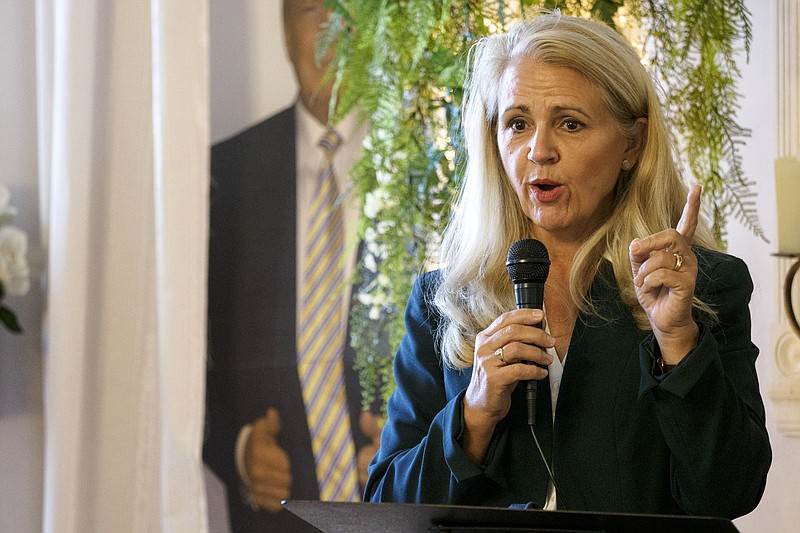NASHVILLE - State Rep. Robin Smith is asking Tennessee Attorney General Herbert Slatery for a legal opinion as to whether employers can require their workers to get COVID-19 vaccinations.
In a Wednesday post to her Facebook page, the Hixson Republican, a registered nurse, wrote that she wants Slatery to provide a formal review of the legal landscape regarding "vaccine mandates and employment" with an eye to both employers and workers.
Smith said although "I can speak firsthand to the effectiveness of the vaccine for our family, I understand the various sides of this argument."
But, she said, employees "deserve their questions answered to make informed decisions.
"Tennesseans want to keep our economy and schools open while being healthy and safe," she added, before stating "strong opinions exist on all sides of this debate with mandates being the easiest path."
And on another note, Smith said that "while private entities and businesses do have the right to have conditions of employment, the unanswered question remains whether those conditions also legally include being forced to accept a substance in one's body against their own will?"
Her letter to Slatery came two days after the U.S. Food and Drug Administration gave formal approval to the Pfizer COVID-19 vaccine, which along with other vaccines had been used under FDA emergency authorization. That gives employers more authority to require vaccinations. Approval comes as the pandemic is surging in Tennessee and other states amid the rise of the more infectious delta variant.
Rep. John Ray Clemmons, a Nashville Democrat and attorney, said he expects Smith will run into problems if she seeks to alter the state's at-will work law at two levels.
One is Republican lawmakers have "been taking donations from NFIB, the Tennessee Chamber and all these groups for years and pushing and touting and celebrated that we have an at-will employment state and that's exactly what she's going to run into."
Moreover, Clemmons predicted, the "attorney general's first sentence is going to be 'Tennessee is an at-will employment state,'" Clement said. "Private employers can fire or terminate an employee for any reason whatsoever as long as it's not a discriminatory action or conduct towards a protected class. And being a non-vaccinated individual is not a protected class."
"It's a two-word attorney general opinion if he actually issues it," said Clemmons, noting Slatery sometimes doesn't respond to legal opinion requests on issues he believes may be headed into court.
In her letter to Slatery, Smith asks what legal standing an employee has in light of Tennessee being a "right to work state" to refuse a COVID-19 vaccination "as a condition of employment." She also asks what legal standing a Tennessee worker has in complying with a vaccine mandate "should an unfavorable, harmful or deadly state of health result from said compliance with an employer mandate as a condition of employment?"
Tennessee is a "right to work" state, which means it has the authority to determine whether workers can be required to join a labor union to get or keep a job, according to the National Conference of State Legislatures.
More importantly in this case, Tennessee is also an "at will" state when it comes to employment law. According to the Tennessee Department of Labor and Workforce Development's website, "employers may legally terminate an employee at any time for any reason, or for no reason without incurring legal liability. However, an employer may not discriminate against any employee on the basis of the employee's race, sex, age, religion, color, national origin, or disability."
Finally, Smith asks Slatery "what legal protections exist for a Tennessee company to establish a vaccine mandate for SARS COV2 in the event an employee or employees have unfavorable, harmful or deadly states of health as a result of complying to said mandate as a condition of employment."
Smith: 'Rights of employees are equally of interest'
Asked Thursday whether she would rule out introducing legislation aimed at restricting or blocking businesses and other employers from requiring COVID-19 vaccine shots should Slatery render an opinion that lawmakers can, Smith told the Times Free Press in a Thursday interview that "I believe that the answer to that question will determine the legislative options that are viable and needed.
"The rights of employees are equally of interest in this question. This is a formula that involves both employers and employees," Smith added. "The answer has to reflect both those factors."
Rebecca Demaree, a Nashville-based attorney with Cornelius & Collins who specializes in health care, labor and employment law, told the Times Free Press back in March that
Contact Andy Sher at asher@timesfreepress.com or 615-255-0550. Follow him on Twitter @AndySher1.
